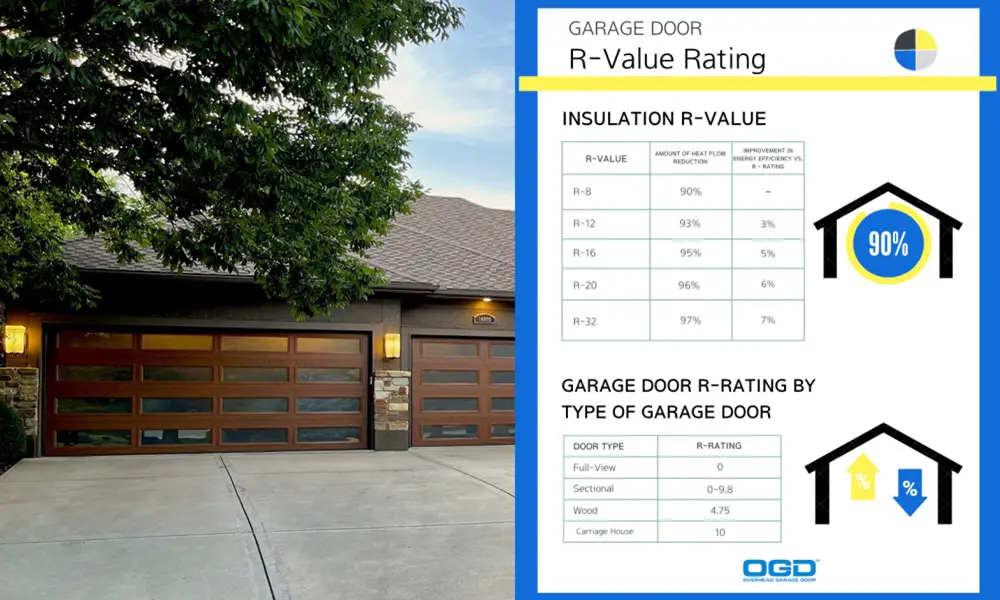When it comes to selecting a garage door, it’s not just about curb appeal; functionality matters too. One critical factor that often takes the backseat in discussions but shouldn’t is the R-value of the garage door. R-value measures the door’s thermal resistance and plays a significant role in insulation. In this article, I’ll explore whether opting for a garage door with a higher R-value is a worthwhile investment for your specific needs.
Benefits of a Higher R-value

1. Energy Savings
A garage door with a higher R-value acts as a robust barrier against temperature extremes. In colder climates, it retains warmth, reducing the need for excessive heating. Conversely, in warmer regions, it keeps the heat out, promoting a cooler indoor environment. The result? Substantial energy savings and a positive impact on your utility bills.
2. Improved Comfort
Imagine stepping into your garage and finding it to be a comfortable haven, regardless of the weather outside. That’s the beauty of a higher R-value garage door. Whether you’re tinkering with projects, storing belongings, or using it as a workout space, the enhanced insulation ensures a consistently pleasant atmosphere.
3. Noise Reduction
Beyond insulation, a higher R-value doubles as a noise barrier. If your garage is close to a bustling street or a noisy neighborhood, investing in a garage door with superior insulation can provide a quieter retreat. Enjoy your space without disturbances, making it ideal for various activities.
4. Increased Property Value
Energy efficiency is a key selling point for homes, and a well-insulated garage can contribute significantly. Potential buyers recognize the value of a home that prioritizes energy conservation, making it a wise investment for the future resale value of your property.
You may also like:
Is 6.5 R-Value Good for Garage Door
Costs and Considerations
1. Higher Initial Cost
Undoubtedly, opting for a garage door with a higher R-value demands a more substantial upfront investment. It’s akin to planting a tree; the initial effort and resources may appear significant, but the long-term benefits are bound to blossom. While the immediate cost may seem steep, the value lies in the enduring advantages that often outweigh the initial expense.
Investing in a garage door with superior insulation pays dividends over time. The enhanced thermal resistance not only safeguards your belongings but also contributes to a more energy-efficient home. As you weigh the price tag, envision the door as a shield against escalating energy bills, offering sustained savings in the future.
2. Payback Period
The payback period for a higher R-value garage door is not a one-size-fits-all calculation. It intricately weaves together factors such as local climate, energy costs, and usage patterns. In regions with harsh climates, the reduced energy bills facilitated by the superior insulation may swiftly offset the initial cost. This prompts a cascade of benefits, making the decision financially astute in the long run.
Consider the payback period as a timeline where your investment starts working for you. The more extreme the climate, the shorter this period tends to be. It’s a strategic financial move that transforms your garage door from a simple fixture to a dynamic contributor to your household’s energy efficiency.
3. Garage Usage
Understanding how you utilize your garage is paramount in the decision-making process. If your garage is an integral part of your daily life, serving as a workshop, storage space, or even an extended living area, the benefits of investing in better insulation and comfort become crucial. The garage evolves into a versatile space, adapting seamlessly to your lifestyle.
Conversely, if your garage is rarely used or detached from your home’s core functions, a lower R-value might suffice. Balancing the cost with the frequency of use ensures that you’re making a practical investment aligned with your specific needs. This tailored approach ensures that you’re not overcommitting to features that won’t significantly enhance your daily life.
4. Other Factors
Beyond the R-value, several additional factors contribute to the overall effectiveness of a garage door’s insulation. The type of insulation, the construction of the door, and any supplementary weatherproofing features all play pivotal roles.
Consider the insulation type – is it polyurethane, polystyrene, or another material? Each comes with its own set of characteristics impacting insulation efficiency. The construction of the door, including its thickness and sealing mechanisms, influences how well it traps heat or cold. Weatherproofing features add an extra layer of protection against the elements.
In evaluating these factors, you’re not just purchasing a garage door; you’re investing in a comprehensive solution. A holistic approach ensures that your choice aligns with your specific climate, usage, and efficiency requirements.
General Recommendations
For Attached Garages in Extreme Climates:
Living in an area that experiences extreme temperature fluctuations demands a garage door that can stand up to the challenge. For attached garages in such unforgiving climates, it’s prudent to consider a garage door with an R-value of 16 or higher.
This robust insulation acts as a formidable shield against the harsh elements, maintaining a consistent and comfortable temperature within the garage. The higher R-value becomes a strategic investment in combating severe cold winters and scorching summers, ensuring your garage remains a haven of comfort throughout the year.
For Attached Garages in Moderate Climates:
In regions where the climate is more temperate, striking a balance between insulation and cost-effectiveness is key. Opting for a garage door with an R-value ranging from 10 to 13 strikes this equilibrium, providing ample insulation to maintain a comfortable indoor environment without unnecessary overinvestment.
This range ensures that your garage remains thermally efficient, offering insulation benefits without burdening your budget. It’s a thoughtful choice for climates that don’t reach extremes, yet benefit from a well-insulated space.
For Detached Garages or Infrequently Used Spaces:
The considerations shift when it comes to detached garages or spaces rarely utilized in daily life. In such scenarios, a lower R-value may be entirely adequate. If the garage isn’t a primary living or working area, investing in an extremely high R-value may not be justified.
Instead, a more modest level of insulation can suffice, meeting the basic requirements without unnecessary expenditure. This tailored approach ensures that you’re optimizing your investment based on the specific needs and usage patterns of the space.
Decision-Making Process
The decision to invest in a higher R-value garage door is personal and requires careful consideration. Research R-values suitable for your climate, compare costs, and consult with professionals for tailored advice.
Conclusion
The decision to opt for a higher R-value garage door depends on your unique circumstances. Consider the potential benefits, weigh them against the costs, and make an informed decision based on your usage patterns and local climate. Thorough research and professional guidance are crucial for making the right choice.
FAQs:
How does the R-value impact energy savings in a garage door?
The R-value indicates the thermal resistance of the door, influencing how well it insulates and retains heat or coolness.
Are higher R-value garage doors always more expensive?
Generally, yes. Higher R-value doors often come with a higher initial cost due to enhanced insulation features.
What is the payback period for a higher R-value garage door?
The payback period varies based on factors like local climate, energy costs, and frequency of garage use.
Is a higher R-value necessary for detached garages?
It may not be necessary, as the benefits may not outweigh the cost for spaces with infrequent use.
Can a garage door with a higher R-value reduce external noise?
Yes, a higher R-value can act as a sound barrier, contributing to noise reduction in your garage.


